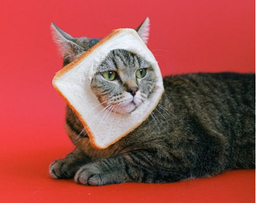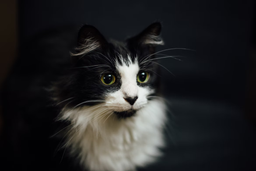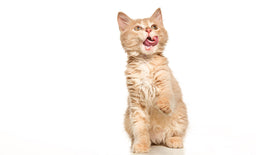Do cats eat mice, and should they?
Cat parents living in houses must have witnessed their kitty catching a mouse, playing with it, and maybe even eating it. Should cats be doing this? Do cats eat mice because they like to, and is it safe for them to do so?
Find out whether such behaviour is something to be concerned about and whether mice are on the forbidden food list for cats!
Why do cats hunt mice?
Hunting is a natural instinct for cats. Wild felines hunt mice, rats, birds, insects, and small reptiles for food and water (they meet their water requirements by eating), but why do domestic cats hunt, then?
Ten thousand years ago, when cats got domesticated, they were often used for pest control, so the hunting instinct persisted. Nowadays, regardless of their lifestyle, domestic cats still feel the need to hunt despite getting a steady supply of food because the habit is engraved in their genetic code.
Indoor cats rarely have access to prey, so they express their hunting urges during playtime. Outdoor felines encounter and hunt many small animals, from squirrels to mice, but what happens when a domestic cat catches their prey?

I don’t know why mum doesn’t like mice. Look how nice my toy is!
Source: billi_chartreux
Do cats eat mice they catch?
Domestic cats will rarely eat mice if they have never done that before. A feline spending a lot of time outdoors hunts to eat if they don’t get enough food for the day.
Cats also bring the prey to their parents as a token of appreciation or to receive praise for their efforts. Another (rather amusing) theory about cats bringing mice inside is that they think of humans as poor hunters.
How do cats eat mice?
Felines who eat mice don’t do so straight away. They play with, push, and throw around the rodent until it goes unconscious or passes away.
After ensuring the mouse doesn’t move anymore, cats will bring it into a secluded area (typically their home) to eat in peace, where no one can steal their food.
Cats typically start from the mouse’s head and proceed to the muscular bits. Veterinarians assume that cats think of the head as a treat. If they’re hungry, they will eat the entire animal, but if not, they will only treat themselves to the rodent’s head.
Why is letting your cat eat a mouse a bad idea?
Eating mice comes naturally to cats, but this delicious treat is not a risk-free snack. That’s why we’ll explain the pros and cons of allowing cats to eat mice.
Felines feasting on rodents can be exposed to:
- Diseases
- Poison their prey previously ingested
Diseases mice can transmit to cats (and even humans)
Mice can transmit various diseases dangerous to felines and humans. Check out the details in the table below:
|
Diseases humans can contract from mice their felines bring into the home |
Diseases that are dangerous to humans and cats |
Diseases caused by ticks and fleas from mice |
|
|
|
What happens when a cat eats a poisoned mouse?
Cats can become sick if they eat a previously poisoned mouse. Symptoms of mouse bait poisoning include:
- Seizures
- Lethargy
- Vomiting
- Nosebleeds
- Poor balance
- Kidney failure
- Excessive drinking
- Excessive drooling
- Breathing difficulties
- Blood in urine, faeces, or both
If you notice the listed symptoms after suspected mouse hunting, you must take your feline to the vet immediately. The following table explains the most commonly used rodenticides and their effect on cats:
|
Category |
Toxic substances |
Effect on cats |
|
Anticoagulants |
Warfarin, bromadiolone, and indanedione |
Prevent cats from synthesising vitamin K, which obstructs blood clotting and causes internal bleeding |
|
Neurotoxins |
Bromethalin |
A lower dose causes loss of balance, hind limb weakness, tremors, and vomiting. Higher doses result in muscle tremors, seizures, ataxia, paddling, and stiff forelegs |
|
Calcium bombs |
Cholecalciferol (vitamin D3) |
Increased calcium levels cause constriction of blood vessels, preventing organs from receiving enough blood |
If you’re using rodenticides, make sure they’re out of your cat’s reach or opt for other pest-control methods. Refrain from using essential oils as pest repellents because they are also toxic to cats.

I’m not hunting anymore, mum, promise. I don’t know how that toy got here, though.
Source: jd.ragdoll
Are there any benefits to allowing cats to eat mice?
Rodents are nutritionally and portion-wise appropriate for a cat. They have a perfect moisture content (70%) which keeps felines optimally hydrated.
Unfortunately, the risks outweigh the benefits, and your cat can get the same nutritional value from safe and healthy products.
Let’s compare the approximate nutritional values of a wild mouse and a tin of Untamed’s popular dish—Chocka Chicken in Gravy—on a dry matter basis (without moisture):
|
Nutrients |
100 grams of a wild mouse |
100 grams of Chocka Chicken in Gravy |
|
Crude protein |
19% |
16.5% |
|
Crude fat |
6.3% |
2.5% |
|
Ash |
8.5% |
2% |
|
Carbohydrates |
1.5% |
0.5% |
|
Of which fibre |
n/a |
0.5% |
|
Vitamin A |
1180 IU |
1053 IU |
Your cat can get all the essential nutrients from Untamed without nasty microorganisms or poisons. Commercial cat food goes through quality checks before manufacturers can sell it. It has also become nutritionally close to a natural feline diet.
I think my cat ate a mouse. What should I do?
If your cat is still not done with the mouse, you must stop them from eating more by:
- Separating the cat from what's left of the rodent
- Picking up any leftovers using a glove or plastic bag
- Thoroughly disinfecting the area where you found the mouse (preferably the whole house)
You should monitor your cat’s behaviour in the next 24 hours. Take them to the vet if they start vomiting, get diarrhoea, or behave oddly.
If your vet isn’t available, you can call the Animal PoisonLine (APL). Veterinary toxicologists will determine whether your cat needs immediate veterinary assistance. APL’s phone number is 01202 509000.
If your cat doesn’t show any symptoms, chances are the mouse wasn’t sick or poisoned. You should give your cat a dewormer anyway and keep your chosen vet’s number at hand.
Treating rodenticide poisoning in cats
Veterinarians perform the following diagnostic procedures to determine whether your cat is suffering from rodenticide toxicosis:
- Physical examination
- CBC (complete blood count)
- Chemistry (biochemical screen)
- Blood clotting (coagulation) profile
- Faecal examination (for bleeding)
- Urinalysis
- EKG
- X-rays of the abdomen and chest
- Abdominal ultrasound
- Echocardiography
If the vet confirms rodenticide poisoning in your cat, they will administer the following treatment:
- Stomach pumping under anaesthesia
- Intravenous fluids
- Activated charcoal
- Gastroprotectants
In severe cases, cats must stay in critical care for up to a week.
How to prevent your cat from eating more mice
You can avoid mice-eating incidents in the future by:
- Installing a sonic pest repellent—Sonic repellents could help keep mice at a distance without harming your cat
- Keeping your cat inside at night—Rodents are nocturnal animals, so keeping your feline inside during the night minimises their chances of stumbling upon mice

It has come to my attention that you want to take this toy away from me, and I’ve decided that you can’t have it.
Source: hellokitties605
What kind of food is appropriate for a cat keen on hunting?
What should cats eat if you’re trying to get them to stop hunting? Some felines prefer wet over dry food and could be hunting because they crave it. Not all jelly and gravy products are good, so your kitty may not be satisfied with low-quality items. Cats are obligate carnivores, and they will go hunting if the most important ingredient in their diet is missing—meat. This crucial ingredient provides essential amino acids (such as taurine), fatty acids, vitamins, and minerals.
Quality cat food has a high protein content (50% or more) and up to 20% fat. It must also be free of:
- Grain fillers
- Additives (such as preservatives and artificial flavourings and colourings)
- Meat derivatives (unknown animal parts, typically organ meat, beaks, and hooves)
Semi-moist food pouches typically don’t meet the necessary nutritional requirements since they’re packed with fillers, sugar, and artificial ingredients.
The table below explains what the best protein sources for cats are:
|
Category |
Ingredients |
|
Poultry |
|
|
Fish |
|
|
Crustaceans |
|
If you’re looking for a vitamin boost, you can opt for products that include a dash of chicken liver.

I get all of this if I stop chasing mice? Sounds like a fair trade!
Image (c) Untamed
A budget-friendly option is mixing wet and dry cat food. You can even add water, soup, or broth to cat biscuits to mimic wet food and add variety to your feline’s diet. Another natural taste enhancer is ham cut into tiny slices.
Regardless of the preferred option, keep in mind that a cat’s daily food intake is usually around 40–45 calories per kilogram of healthy body weight.
Since my cat likes to hunt, they must like raw food, right?
Raw meat may seem like a good idea because your cat’s natural diet consists of it. Unfortunately, raw chicken (and other meat) is quite different from the fresh prey wild cats eat immediately after killing it. Raw food from the human food supply chain can be full of pathogens you can eliminate only by cooking. The same goes for eggs, which are also high in cholesterol.
The texture of wet food is pretty close to that of raw food, and it doesn’t come with the risk of disease.
Other food your cat should avoid
Not all dangers are outdoors. Some products from your fridge could harm your cat.
Here's the list of "the forbidden fruit":
- Milk and dairy products, such as cheese—All kinds of milk, even lactose-free products, cause pain, stomach upsets, and runny stools in cats. Yoghurt is less harmful but should be consumed in moderation
- Pork and beef—Cattle meat works better as an occasional treat because it’s too high in calories. Beef is even a common allergen for cats, which is why hypoallergenic products are never made from beef
- Coffee and products containing cocoa, such as chocolate—These popular products are toxic to cats and shouldn't be part of their diet
- Fruits and veggies—Cats can’t process protein from plants or properly digest sugar, so a vegan diet will not do your feline any good. Some parts of fruits and veggies can even cause serious health problems, such as kidney failure or cyanide poisoning
- Dog food—Canine food isn’t toxic to cats, but your feline’s nutritional needs are pretty different from your dog’s, so you should stick to products designed for cats
Untamed offers the taste of the wild
Untamed team loves and respects cats, so we learned everything about their nutritional needs to help them thrive. Our vet-formulated recipes cater to cats of any:
- Breed—Untamed is suitable for cats of all breeds, be it Bengal, Persian, Ragdoll, Siamese, Maine Coon, or British Shorthair
- Lifestyle—Whether your kitty is indoorsy or outdoorsy, they will find a favourite among our delicious recipes
- Life stage—Our meals are specifically formulated to support growth and maintain a healthy weight throughout your cat’s life, as a kitten, adult, and senior (pregnant queens and neutered gents also enjoy our delicacies)
- Personality—Untamed found its way to curious and finicky cats because our dishes taste great
What makes Untamed different?
We believe in ethical food production and abide by the highest standards of quality and taste.
We take pride in:
- Producing food with double the protein than the industry standard
- Using human-grade ingredients from sustainable and dolphin-safe sources
- Leaving a neutral carbon footprint
- Having a customer-oriented, fully customisable ordering system
The Untamed effect
Cat parents who tried Untamed report the following improvements in their cats' overall health:
|
When |
What happened |
|
After one week |
|
|
After two months |
|
|
After four months |
|
|
For life |
|
If you would like to see your cat experience the same Untamed effect, order our trial pack NOW!

Maybe if I pretend the dish is a mouse, I won’t have to chase them anymore!
Image (c) Untamed
No hunting needed—order your Untamed delivery in no time!
All you need to do to get a tailor-made box of kitty delicacies delivered to your doorstep is:
- Visit our Try Now page
- Complete a simple questionnaire
- Select a meal plan
Your trial cat food package will be with you in a day. If your kitty enjoys Untamed dishes, we can deliver the goods regularly. Don’t worry—no date is set in stone! You can always modify, postpone, pause, or cancel your cat food delivery.
Help! My cat doesn’t want to switch from hunting prey to eating commercial cat food
If your kitty got used to hunting outside, you might have a hard time convincing them that commercial food is better. In case your furry friend rejects wet food you carefully picked out, you can try:
- Warming up the food to room temperature or slightly higher—It'll boost the aroma and entice your cat's appetite
- Keeping your feline inside for a while—There'll be some meowing and clawing on the door, but you’ll put a stop to your feline’s hunting habits
- Adding different brands and types of food—You can mix and match food until you find a combination your kitty enjoys
- Establishing a consistent feeding schedule—You should offer your kitty food at the same time every day. If your feline refuses to eat, remove the dish after 15 minutes and skip that meal
- Including more playtime during the day—Your cat’s outdoor gastronomic adventures might imply that they need more exercise, plus, the extra workout will make them hungry
What other animals do cats hunt that could cause them harm?
We may perceive mice as cats' natural enemies, but other animals are also on your feline hunting list. Check the details in the following table:
|
Animals |
Why are they harmful? |
Symptoms |
|
Lizards |
Liver flukes and salmonellosis |
|
|
Birds |
Salmonellosis and bird flu (in rare cases) |
|
|
Toads |
Toxic glands |
|
|
Rabbits |
Tularemia |
|
|
Squirrels and chipmunks |
Leptospirosis, salmonellosis, and parasites |
|

![Best food for Ragdoll cats in the UK [Broken Down]](http://untamed.com/cdn/shop/articles/featured_best_food_for_ragdoll_cats_uk.jpg?v=1646818249&width=256)

